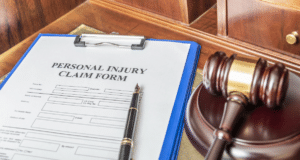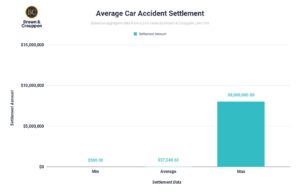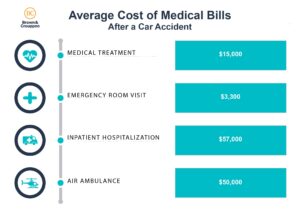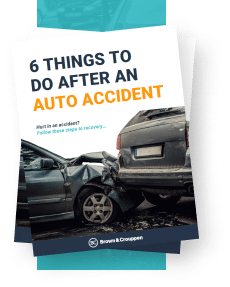Each case is unique, and the amount that you may receive from your PTSD claim will vary depending on the severity of PTSD, accompanying injuries, and other case factors that are detailed below. Our personal injury attorneys have helped thousands of individuals recover compensation for injuries, including individuals who suffer from PTSD. If you or a loved one is suffering from PTSD or has symptoms, you may be eligible to recover compensation. Getting started with your case is easy. Call 888-801-4813 or request a free case evaluation online. And remember, there are no upfront costs or legal fees – we only get paid if you win.
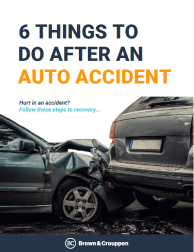

Use our legal checklist to learn what to do after an accident and understand key legal considerations for recovering financial compensation.
Factors that Affect PTSD Settlement Amounts
1. Injury Extent & Severity
The extent and severity of the injuries sustained in the incident leading to PTSD can significantly influence the compensation award. For example, traumatic brain injuries and permanent disfigurement of your body due to a car collision can contribute to higher damages against the responsible party.
These hypothetical situations explain how the extent and severity of the injuries sustained in the incident can result in different settlement amounts.
- Example #1: Following a rear-end collision at a red light, a 50-year-old man experienced severe whiplash, necessitating a week off work. Subsequently, he developed a fear of driving and began experiencing PTSD symptoms, including sleep disturbances and irritability. Seeking therapy for one month helped him manage these symptoms, allowing him to return to his regular daily routine gradually.
- Example #2: A 32-year-old woman was in a severe T-bone collision while commuting to work. The impact caused her vehicle to flip over, resulting in multiple fractures and lacerations, leaving permanent scars. As a result, she had to take three weeks off work and missed her niece’s graduation ceremony to recover. After the collision, she struggled with intense anxiety and driving-related fear. After consulting a medical professional, she was led to a diagnosis of anxiety disorder and PTSD. She refrained from driving for several months and struggled with self-esteem due to her scars. She sought out professional treatment to help in managing her symptoms and recovery process.
- Example #3: A 22-year-old man sustained severe injuries as a passenger in a high-speed collision involving a semi-truck veering into his lane. He suffered a head injury, post-concussion syndrome, and multiple fractures, requiring emergency room treatment and prolonged recovery. Witnessing the traumatic injury to the driver further impacted him. The incident left him with lasting psychological effects, including depression, anxiety, and a fear of being a passenger in vehicles due to a sense of loss of control. A professional diagnosis confirmed depression and PTSD. His injuries resulted in missed weeks of work and significant life events during his recovery.
2. Loss of Income & Working Potential
The symptoms of PTSD can affect an individual’s ability to work. This can include a reduction or absence of earnings and the capacity to work. PTSD can disrupt career trajectories by stopping individuals from engaging in education or training, thus hindering their working potential. The loss of income and working potential from PTSD can have significant long-term implications for an individual and their families.
These hypothetical situations explain how the lost wages and working potential from injuries sustained in the incident can result in different settlement amounts:
- Example #1: A 40-year-old man needs to take a two-week break from work, followed by a gradual increase in his working hours over a month as he recuperates until he resumes his regular schedule.
- Example #2: A 35-year-old woman had to take a month off from work and miss essential work training, which was required for a promotion during training.
- Example #3: A 26-year-old medical student to take a semester off from school to recover from their injuries.
- Example #4: A 50-year-old full-time teacher was compelled to transition to substitute teaching duties due to the severity of their injuries.
- Example #5: A 22-year-old model is finding it challenging to continue their career due to physical disfigurement from their injuries.
- Example #6: Due to the severity of her injuries, a 19-year-old woman has to change her college major to a career path that demands less physical exertion.
3. Impact on Daily Life
PTSD can impact every aspect of an individual’s life, including relationships with family, friends, and colleagues, disruption of daily routines and activities, and avoidance of activities to cope with distressing memories or reminders of traumatic events.
These hypothetical situations explain how the effects of PTSD in your daily life from injuries sustained in the incident can result in different settlement amounts:
- Example #1: A 20-year-old woman finds herself grappling with anxiety and fear during any commute from her hometown to college following a car collision.
- Example #2: A 26-year-old woman is hindered from visiting family or friends who are dog owners after a traumatic dog bite incident.
- Example #3: A 45-year-old woman develops a fear of swimming or being near water after surviving a boating incident, limiting her ability to participate in family vacations.
- Example #4: A 37-year-old mother struggles with severe anxiety whenever she encounters an intersection due to a past traumatic car crash, affecting her ability to navigate daily tasks like grocery shopping.
- Example #5: A 43-year-old man avoids going to the doctor’s office after losing a loved one in a situation involving medical malpractice.
- Example #6: A 37-year-old man struggling with PTSD after a traumatic event finds himself late to drop off his kids at school due to disruptions in his sleep patterns.
About PTSD & Common Symptoms
Post-traumatic stress disorder (PTSD) is a mental health condition that can develop following exposure to a traumatic event. The aftermath of such experiences can profoundly impact a person’s emotional and psychological well-being.
Symptoms of PTSD include, but are not limited to:
- Intrusive memories or flashbacks of the incident
- Persistent negative beliefs about oneself, others, or the world
- Anger, guilt, shame, and anxiety
- Diminished interest or participation in significant life activities
- Feelings of detachment or estrangement from others
- Mood swings
- Physical symptoms such as headaches, stomachaches, and chest pains
- Avoiding being in similar situations as a traumatic incident
- Depersonalization or feeling detached from one’s body
- Sleep disturbance
- Problems with concentration
- Immense grief or sadness
- Hypervigilance
- Reckless or self-destructive behavior
See our guide about common signs of PTSD after an accident, for more information about what to do following an accident.
Types of Accidents and Injuries that Lead to PTSD
Motor Vehicle Crashes
Experiencing a significant car, motorcycle, or any other motorized vehicle collision can leave lingering emotional trauma on individuals throughout their lives, even past the physical injuries’ recovery. The emotional toll of a vehicular collision can manifest in various ways, all unique to each person. If you’ve been injured in an auto accident and suffered PTSD, you may be eligible to recover compensation following the car accident for various economic and non-economic damages.
Wrongful Death
In the event of a tragic wrongful death of a loved one due to someone else’s negligence, surviving individuals may find themselves struggling with emotional grief and PTSD as they recover from the trauma of the circumstances surrounding their loved one’s death.
Medical Trauma
Experiencing medical malpractice during procedures, surgeries, or in medical settings can have profound psychological impacts, potentially leading to symptoms of post-traumatic stress disorder (PTSD). Individuals can experience PTSD symptoms that include a feeling of untrustworthiness towards medical professionals and institutions, as well as a loss of control over their health and well-being.
Animal Attacks
Suffering an attack or severe injury inflicted by an animal, such as a dog bite, can be profoundly traumatic and may precipitate symptoms of post-traumatic stress disorder (PTSD). This is particularly true when the attack results in physical disfigurement or lasting scars. The sudden and violent nature of such incidents can leave individuals feeling vulnerable and fearful of potential threats in their environment.
Near-Drowning Incidents
In the event of a near-drowning incident, whether it occurs in a controlled environment like a swimming pool or a natural body of water such as a lake or ocean, the potential for developing post-traumatic stress disorder (PTSD) is significant for both the individual directly involved and their loved ones who may have experienced the consequences of the harm.
Nursing Home Abuse
Abuse in nursing homes encompasses various forms of mistreatment that can cause severe trauma for elderly residents and their families. This mistreatment includes physical abuse, emotional abuse, and neglect of elderly individuals. These incidents can lead to profound psychological distress and may result in post-traumatic stress disorder (PTSD) for the affected individuals.
Get Help from a Personal Injury Attorney at Brown and Crouppen Law Firm
If you or a loved one is suffering due to post-traumatic stress disorder (PTSD) following a traumatic incident, you might be eligible to recover compensation. The choice of a lawyer is vital and should not be decided without careful consideration. Our legal team is here to help you learn more about your legal options and evaluate the strength of your PTSD lawsuit. We care about our community and have dedicated our practice to helping injury victims recover justice, accountability, and compensation.
Get started today with your free case evaluation by visiting Brown & Crouppen online or by calling us at 888-801-4813. Our St. Louis and Kansas City personal injury lawyers have helped clients recover over $1 billion in settlements and verdicts. And remember, there are no upfront costs or legal fees – we only get paid if you win.

